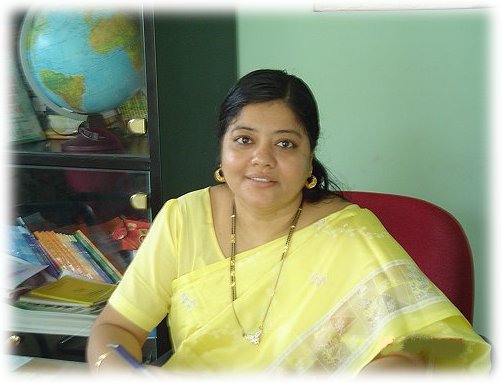
Spiritual Success in
Modern Education
Jareena Begum
Education means the first step for the child into the world outside his
home. Ideally, children should be enthusiastic to come to school, a place where they find
the fun and joy of learning. They are entering a new world with abundant love and
curiosity.
But in our country, what we emphasize in the early years is the skill
of reading, writing and simple arithmetic. In the class and for daily homework, repetitive
writing of the alphabet is being assigned for 3 1/2 year olds. How will a child express
her love, imagination and creativity in such a condition?
Children by nature are very curious, which helps them learn many
things on their own. They can express themselves very clearly through hearing and
observing the world around them. They clear the doubts in their minds by asking questions
which is the natural process of a child's education. A teacher should be ready and eager to
answer their questions. If the teacher asks the child a question, the child should be
rewarded with immediate approbation for her correct answer. If her answer is incorrect, it
should be calmly explained to her what she did not understand. This should be done in such
a way that the child does not feel humiliated or discouraged.
If we consider this from the angle of human psychology, the freedom to
learn and make mistakes given to any child will lead to creative thinking and discovery.
Restriction to a single topic or forcing a child to memorise passages will lead to a dull
mind.
The child learns better and faster by observing. Observation leads to
thinking. But it is imperative that the child is allowed to learn at her own speed,
according to her own likes and interest. We may ask if this is possible to implement in
Indian schools today. It is, of course. In our school we offer all of these opportunities
to our children. In Primrose School we have taken up the methods evolved by Dr. Glenn
Doman of the Institutes for the Achievement of Human Potential, USA. We practise his
method of flash cards for early reading and general knowledge. This system awakens the
curiosity of the child even as early as pre-KG or two years of age. There is a joy in
constantly learning new information shown on the flash cards and pride in the new skill of
reading.
By the second standard, we encourage children to write their own stories and
essays. If a topic is given to thirty children in our class and they are asked to write
about it, each child will have her own idea and will express her creativity in a different
way. The original ideas of thirty different children create a new hybrid delicious fruit.
Besides giving children academic freedom and encouraging their
curiosity, we would like to pass on certain values to them like truthfulness, punctuality,
honesty, generosity, kindness, self-confidence, cleanliness, sincerity and simplicity.
Children are always watching and imitating each and every
aspect of their teachers' behaviour. When you ask a child about her future
ambition, often her wish would be to become a teacher, because she admires all
the valuable qualities of her teacher.
If a child is undisciplined in class, instead of becoming
irritated, the teachershould try to look into the matter calmly,
to understand what caused the wrong behaviour by her own introspection. In
our school punishment is forbidden. No teacher should even scold or threaten children. In
due course, the teacher should discover her own faults and put that knowledge to use.
Though it is very difficult to accept one's mistakes, we must try to change our own
behaviour. Then the child will also
automatically change her behaviour. We believe that if children are to be taught not to
lie, the teacher must be the first to abolish lying in herself. A child will respect a teacher for what she
is, not for what she says.
It is said that teachers are our second mothers, as they nourish the
child with abundant love and affection.
Today's children have immense opportunities before them. They have the
capacity to become famous personalities in future. In our school we are not only educating
the children but simultaneously nourishing them with as much affection as we can give
them. If teachers everywhere practice the
above ideas, definitely children can achieve whatever they choose as a goal. As teachers,
we can produce many truly successful and talented citizens for India.
home
our vision academics
admissions calendar
photo gallery student
resources links contact us

